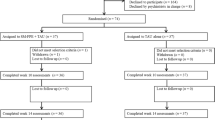Abstract
Background: The effectiveness of family intervention in schizophrenia has mainly been tested by controlled trials which recruited patients after hospital discharge. Less is known about its effectiveness when chronic schizophrenics displaying negative rather than positive symptoms are engaged in treatment. This study was conducted in two community-based rehabilitation units for chronic psychiatric patients and was planned to test: (1) whether family intervention combined with individual psychosocial treatment is more effective than individual psychosocial treatment in improving the clinical and social prognosis of schizophrenic patients belonging to high expressed emotion (high-EE) families, and (2) whether family intervention exerts its effect on the patients through the reduction of EE in their families. Methods: Forty patients from high-EE families, all under neuroleptic medication and in remission at intake, were evenly assigned to individual psychosocial treatment or to psychoeducational family intervention plus individual psychosocial treatment. Individual treatment consisted of vocational and social skills training; family intervention mainly comprised 13 group sessions with relatives. Patients were treated for 12 months and were followed-up for the next 2 years. Measures of clinical outcome comprised relapse, hospitalization and clinical exacerbation. Measures of social outcome included social functioning and role performance. Re-employment served as an additional measure at the follow-up assessments. Results: The experimentals were free of relapses and hospitalizations during the 1st year of follow-up. The difference in relapse rates between experimentals and controls over the same period was statistically significant (P = 0.05), especially if drop-outs were included in the statistical analysis. The difference in hospitalization rates did not yield any statistical significance. All differences declined in the 2nd year of follow-up. Family intervention was found to be positively, but not significantly, associated with higher reversal rates from high to low EE, especially among full attenders of relatives' group sessions. High EE was identified as a predictor of relapse, but not of hospitalization, over the 2-year follow-up period. Conclusion: Results support the importance of encompassing family members in the community care and tertiary prevention of schizophrenia.
Similar content being viewed by others
Author information
Authors and Affiliations
Additional information
Accepted: 21 August 2000
Rights and permissions
About this article
Cite this article
Tomaras, V., Mavreas, V., Economou, M. et al. The effect of family intervention on chronic schizophrenics under individual psychosocial treatment: a 3-year study. Soc Psychiatry Psychiatr Epidemiol 35, 487–493 (2000). https://doi.org/10.1007/s001270050269
Issue Date:
DOI: https://doi.org/10.1007/s001270050269



